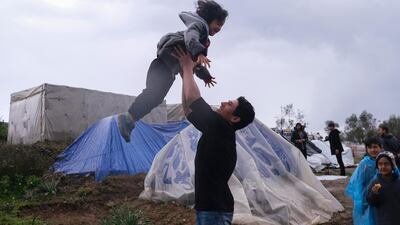Migrants on Greek islands will be offered €2,000 (Dh 8,200) per person to return to their homelands under a scheme launched by the European Union that seeks to relieve the overcrowding in the camps.
The money, which is more than five times the usual sum offered to migrants to help them return to their country of origin, will be offered under a voluntary returns programme run by the United Nations International Organisation for Migration (IOM) and EU border agency Frontex.
People who have arrived on the Eastern Aegean islands including Lesbos, Chios and Samos will have only a month to sign up for the scheme so that it is not abused, amid a fear that it will attract more migrants from neighbouring Turkey.
The funds will not apply to refugees who have fled persecution but the measures are expected to incentivise economic migrants to return home.
Thousands of refugees are in the camps in the Greek islands, many of which don’t have the infrastructure to cope with surge in arrivals.
“Refugees will not return — of course, they can’t return — but economic migrants that maybe know they will not get a positive asylum decision could be interested in doing that,” EU home affairs commissioner Ylva Johansson told reporters after a meeting she held with Greek migration minister Notis Mitarachi in Athens.
The European commission hopes 5,000 people will sign up to the scheme, adding to the 18,151 who have chosen to return home from Greece under another EU voluntary returns programme since 2016.
In March 2016, Brussels and Ankara outlined an agreement under which Turkey was expected to prevent migration from Turkey to Greece. In return, Turkey would receive increased financial support, as it hosted more than 4 million refugees, including 3.7 million Syrians, staving off Europe’s biggest refugee influx since the Second World War.
But earlier this month, around 35,000 migrants reached the Turkish border with the EU after Ankara publicly told millions of migrants and asylum seekers that it would not stand in their way if they wanted to head to Europe. Turkey then urged Greece to open its border to let migrants into Europe.
Ursula von der Leyen, president of the European Commission, accused Turkish President Recep Tayyip Erdogan of playing politics with the border to gain concessions from the bloc.
Mr Erdogan, however, has accused Europe of not showing solidarity with Turkey after tens of thousands of refugees were displaced from their homes in Syria’s Idlib province.
On Tuesday, the two parties agreed to review the migration deal.
On March 3, the EU committed €700m in funds for Greece, including €350m available immediately to upgrade infrastructure at the border.

